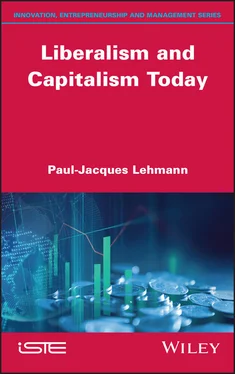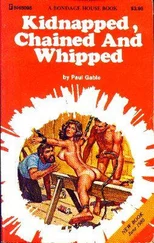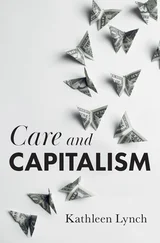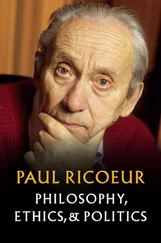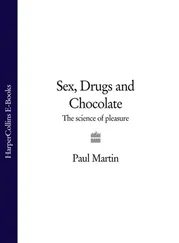Property is also essential for the appearance of capital, the basis of production alongside labor. Indeed, all production presupposes prior appropriation, in the same way that exchange only concerns objects belonging to someone: a person is only free to do what they want with the property they own if they are the owner. Consequently, capitalism exists only if it is based on the acceptance of private property, in particular the means of production. Private owners, in pursuit of their own interests, then have capital at their disposal to accumulate wealth.
Moreover, individual responsibility is based on private property and freedom. These three factors of capitalism are linked and have developed in parallel. First, each individual must be responsible for their choices and actions. They must be aware that life is a constant struggle, that all decisions they make involve risks and that they must take them: capitalism is the economy of risk. However, they must be optimistic for the future, because the work they will do will allow them to move up the social hierarchy and see their wealth increase. “By increasing the amount of wealth, property contributes to sociability”.
We have seen that freedom is the basis of all human activities: the existence of private property is both the condition and the consequence of this freedom. Since, henceforth, property is the result of work, it can only exist if people are free. Indeed, liberals refuse to consider work as a factor of humanity’s annihilation, but on the contrary consider it as a means of independence. Work cannot do without property any more than property can do without work: the respect accorded to work comes from the respect owed to the person, whose freedom is the fundamental characteristic. Living in the midst of owners, any individual who is not yet an owner is encouraged to become one and will be able to do so thanks to their freedom and their work.
Nonetheless, once again, de Tocqueville explained that we should not hide the fact that property leads to unequal conditions in the social state.
The right to property, like all other rights that generate freedom, can only be exercised if there is freedom of contract, which allows weak people to be protected against the arbitrariness of the powerful, who are inherently brutal. A competitive economy can only exist with strong and constantly renewed contractual commitments. The signing of contracts also constitutes the necessary counterweight to respect for others and to the word given. If the latter is broken or the rules laid down by the legislator are flouted, sanctions must be applied to the offenders. Moreover, it is in the interest of all actors that contracts regulate economic operations a priori , because it is their very security that is at stake: the integrity of each individual is in the interest of the common good and is the basis of the trust necessary for human relations. Liberalism that is not framed by the rule of law, which ensures its proper functioning, inevitably turns into anarchy.
Private property was born with agriculture. In the past, people lived from hunting in areas close to where they lived and had no need to have any rights to the land they cultivated. They simply sought food. However, as soon as they became farmers, as soon as they got the food that they and their families consumed from the land, they wanted to protect the piece of land they were farming: through legislation, especially property rights, family land ownership appeared. Some individuals then owned more than the one piece of land needed for their own consumption. They sold the surplus and had income that allowed them to meet other, previously unknown needs.
Originally small in size, land ownership would not cease to grow, becoming seigniorial or domanial throughout Antiquity and the Middle Ages, leading to the power, both political and economic, of its owners, and to the material and moral misery of other members of the agricultural class who saw no hope for their future. The form of ownership determined the political system of a nation. The concentration of property in a small number of hands was harmful for political freedom, because then the aristocracy prevailed: the people could not be entrusted with the control of political decisions when they were not empowered to manage private interests.
As we will see, the rural exodus of peasants to the factory and the city reduced the number of landowners while increasing the size of each estate. However, one of the main causes of pauperism lay in the existence of the indivision of land. De Tocqueville (2010) therefore recommended, as was the case in France and contrary to what existed in his time in England, the maintenance of small plots as a means of fighting poverty, so that poor peasants had something that belonged to them that could be exploited when economic difficulties arose: “The small landowner receives impetus only from himself, his sphere is narrow, but he moves freely within it. His fortune grows slowly, but it is not subject to sudden chance. His mind is tranquil as his destiny, his tastes regular and peaceful as his work, and, needing precisely no one, he places the spirit of independence in the midst of poverty itself”.
Moreover, when property was owned by a large number of citizens, democracy was easier to establish and apply satisfactorily since responsibilities could be shared. “There is nothing more conducive to the rule of democracy than the division of land into small properties”. However, de Tocqueville explained, and this was a very common argument in his own country, that French centralization encouraged a large number of small landowners to come to Paris to take up much more rewarding positions, close to power, in the public administration, while entrusting farmers with the exploitation of their land. However, on the one hand, these farmers did not have a spirit of innovation and therefore did not advance agriculture, and, on the other hand, the landowners became bourgeois, forming a very powerful class enjoying many privileges.
With liberalism and the emergence of the capitalist enterprise, the nature of property rights changed: land and family property was divided and became movable, both individual and collective.
1.2.3. Property rights and savings
The right to hold property involves the right to dispose of one’s own property, to sell it, to give it away and to pass it on through inheritance, so that “property breeds property”. In particular, the right to property means that savings can exist. Indeed, it is an essential element for thinking about the future: people became provident as soon as they knew that they risked losing things they cared about, and they knew that, with the right of ownership, they would be able to bequeath to their offspring what they had saved. However, no one agrees to work if they are not sure that them or their descendants will benefit from the fruits of their activity, that is, from the savings they manage to build up. An individual therefore tends to do everything to increase their wealth and put aside what they do not consume. As soon as individuals felt fully responsible for their fate and were convinced that only their efforts were likely to make them progress in the social hierarchy, not only did they enrich themselves, but they also became actors in the progress of their country.
We will see that Weber explains that this willingness to save and the foresight it generates through property rights have combined with the precepts of Protestantism and constitute the essential causes of the development of capitalism through the investment to which these two attitudes lead. Wealth can then increase and, as a direct consequence, more and more rich people appear. On the contrary, the absence of savings – a consequence of the absence of property – is an insurmountable obstacle to becoming rich: not only do people not see the usefulness of working, but even if they did work, they would immediately spend all their income.
Читать дальше
